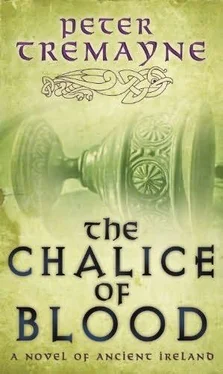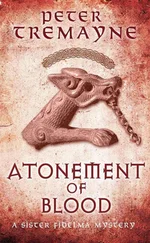Peter Tremayne - Chalice of Blood
Здесь есть возможность читать онлайн «Peter Tremayne - Chalice of Blood» весь текст электронной книги совершенно бесплатно (целиком полную версию без сокращений). В некоторых случаях можно слушать аудио, скачать через торрент в формате fb2 и присутствует краткое содержание. Жанр: Исторический детектив, на английском языке. Описание произведения, (предисловие) а так же отзывы посетителей доступны на портале библиотеки ЛибКат.
- Название:Chalice of Blood
- Автор:
- Жанр:
- Год:неизвестен
- ISBN:нет данных
- Рейтинг книги:5 / 5. Голосов: 1
-
Избранное:Добавить в избранное
- Отзывы:
-
Ваша оценка:
- 100
- 1
- 2
- 3
- 4
- 5
Chalice of Blood: краткое содержание, описание и аннотация
Предлагаем к чтению аннотацию, описание, краткое содержание или предисловие (зависит от того, что написал сам автор книги «Chalice of Blood»). Если вы не нашли необходимую информацию о книге — напишите в комментариях, мы постараемся отыскать её.
Chalice of Blood — читать онлайн бесплатно полную книгу (весь текст) целиком
Ниже представлен текст книги, разбитый по страницам. Система сохранения места последней прочитанной страницы, позволяет с удобством читать онлайн бесплатно книгу «Chalice of Blood», без необходимости каждый раз заново искать на чём Вы остановились. Поставьте закладку, и сможете в любой момент перейти на страницу, на которой закончили чтение.
Интервал:
Закладка:
‘Brother Lugna appears very involved in the proposals to rebuild the abbey.’
‘Indeed, he is. When he arrived here he was always boasting of the great stone buildings he had seen in Rome. He felt that this abbey should be built in their image.’
‘But I thought it was Lady Eithne’s idea as a tribute to her sons. Are you saying that it was Brother Lugna who persuaded Lady Eithne to rebuild the abbey?’
‘Brother Lugna is a strong personality and no doubt when Abbot Iarnla is taken to the heavenly pasture, Brother Lugna will be his succesor,’ replied Brother Donnán glumly. ‘At that time, I have no doubt that as abbot he will introduce the Penitentials and Benedictine Rule. Let us pray that Abbot Iarnla may have a long life before him.’
‘I suspect that you do not approve of Brother Lugna?’ Eadulf remarked with humour. ‘Do I detect that your steward is not entirely popular?’
The fat librarian grinned. ‘You have a keen eye, Brother Eadulf,’ he replied.
‘Brother Lugna can only enforce his changes if he is elected abbot and the community approve the changes,’ pointed out Fidelma more seriously. This was the custom of all the abbeys and of the native churches. Abbots were chosen and elected in the same way that chieftains and kings were chosen. In the abbeys the community were considered the family of the abbot and therefore it was the derbhfine , the electoral college, who chose and endorsed his successor.
‘True enough, Sister,’ agreed the scriptor . ‘But, as I say, let us hope that the day when Abbot Iarnla stands down as abbot is a long way ahead of us. But enough gossip. I am sure you have come to speak to me about the death of poor Brother Donnchad. How may I serve you?’
‘I am sure that you must have known him well,’ said Fidelma. ‘His reputation as a scholar was well known.’
‘I thought I knew him well enough. I joined the community shortly after he and his brother Cathal did. Both of them spent most of their time in our scriptorium , as did I.’ He gestured with his podgy hand around the hall. ‘They were both scholars of considerable merit. And a great asset to the reputation of this library.’
‘You certainly have a magnificent library, Brother Donnán,’ agreed Eadulf.
The fat librarian seemed to appreciate the praise. ‘We have a great many books here,’ he said with satisfaction. Then his expression changed into one of seriousness. ‘But it is not for books that you have come here.’
‘Would you know Brother Donnchad’s handwriting?’ Fidelma asked.
The scriptor nodded. ‘I believe I would. He wrote with a distinctive style.’
Fidelma produced the scrap of parchment they had found below Donnchad’s window.
‘Si vis transfer calicem istrum a me … Deicide! Deicide! Deicide!’ muttered Brother Donnán as he studied the text.
‘Is that his hand?’ pressed Fidelma.
‘It is not much of a sample by which to judge,’ he said. Then he glanced at it again and shook his head. ‘I would say that Brother Donnchad did not write this.’
‘What subjects was he interested in?’
‘Arguments on philosophical matters mostly. But that was before he left on his pilgrimage.’
‘Did he continue to research here after he returned from his pilgrimage?’
The scriptor shook his head immediately. ‘He did request parchment, ink and quills and I provided him with what he wanted. Such writing materials are getting expensive these days,’ he added.
‘And where are his writings now?’
‘I had assumed they would be in his room but I have heard a rumour that there was nothing there.’
‘Did he leave anything in the library, anything at all?’
‘He lodged several of his early works here as well as copies he made of other scholars’ work. He was a good copyist and his own commentaries were excellent. But that was, of course, before he went on his pilgrimage and I suspect you are more interested in the period following his return.’
‘Your suspicion is correct, Brother Donnán.’
‘Well, he came here several times. I think he was checking references in other works. But I never heard of anything he was writing.’
‘Some libraries keep a record of what books their scholars examine,’ Eadulf said. ‘Do you?’
Brother Donnán glanced towards a desk in the corner. ‘I pride myself on the way I run this library. I do keep a list of the items that members of the brethren ask for in the library.’ He smiled briefly.
‘So what manner of manuscripts was Brother Donnchad interested in?’ asked Fidelma.
‘Works on the philosophy of the Faith mainly, particularly the works of the founding fathers.’
‘Can you be more specific?’
Brother Donnán hesitated, thinking, before he said, ‘He asked to see the works of Origenes.’
‘Origenes?’ Eadulf frowned.
‘A Greek from Alexandria who was one of the great early theologians of the Faith,’ explained Brother Donnán. ‘He lived many centuries ago. He was nicknamed Adamantios — the unbreakable one.’
‘And do you have copies of his works here?’ Fidelma asked.
The scriptor smiled. ‘Not everything of his, I grant you, lady. But we have some of his important works such as On First Principles , some of his many commentaries on the books of the Bible, essays on prayer and on martyrdom …’
‘Do you remember what work Brother Donnchad was particularly interested in?’
Brother Donnán shrugged. ‘Not offhand.’
Eadulf glanced across to the desk in the corner. ‘Then perhaps your lists will provide an answer,’ he suggested, moving towards it.
Brother Donnán hurried forward to the large side table on which a ledger rested. Near the table was a member of the brethren deep in study of one of the manuscript books. He looked up as they approached and smiled briefly. It was the bruigad ,the keeper of the guesthouse, Brother Máel Eoin. They exchanged a smile of recognition before he returned to the work he was reading. Brother Donnán started to turn the pages of the ledger. Fidelma and Eadulf peered over his shoulders. The pages consisted of lists given under various names. The scriptor halted at a page headed with Donnchad’s name and began running his finger quickly down the list.
‘Origenes,’ Fidelma said sharply. ‘You ran past the name, Brother Donnán. See there? It says Origenes, eight books entitled Contra Celsum , and you have marked it as a specific request. Isn’t that date only a few days before Brother Donnchad was killed?’
The scriptor flushed, apparently embarrassed at nearly missing the entry. ‘Indeed, I believe it was a week before he died.’
‘ Contra Celsum ? What is that?’ asked Eadulf.
‘Arguments against Celsus; he was a pagan writer.’
‘I have to admit, Brother Donnán, that I have never heard of Celsus.’
‘Better that no one hears of him,’ replied the scriptor in disapproval. ‘He was a great opponent of the True Faith. However, Origenes pointed out the error of his ways so that people could see his arguments were false.’
‘And do you have this work here?’ asked Fidelma.
Brother Donnán shook his head indignantly. ‘How can you ask if we have the work of Celsus, a pagan, in a Christian library, Sister? For shame.’
‘I meant the work of Origenes, the work that Brother Donnchad requested.’ Fidelma chose not to point out that most libraries were filled with the works of Greeks and Latins who had lived long before the coming of the Faith.
‘We do — or rather we did. The abbey at Ard Mór requested that we lend them the copy. We frequently exchange books with them. As soon as Brother Donnchad had finished with it, wesent it to the abbey of Ard Mór with someone who was making the journey there.’
Читать дальшеИнтервал:
Закладка:
Похожие книги на «Chalice of Blood»
Представляем Вашему вниманию похожие книги на «Chalice of Blood» списком для выбора. Мы отобрали схожую по названию и смыслу литературу в надежде предоставить читателям больше вариантов отыскать новые, интересные, ещё непрочитанные произведения.
Обсуждение, отзывы о книге «Chalice of Blood» и просто собственные мнения читателей. Оставьте ваши комментарии, напишите, что Вы думаете о произведении, его смысле или главных героях. Укажите что конкретно понравилось, а что нет, и почему Вы так считаете.











